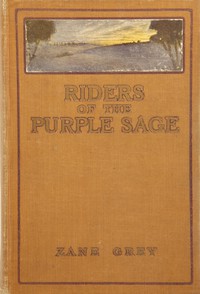The Desert of Wheat by Zane Grey (top 100 books to read .txt) 📖

- Author: Zane Grey
Book online «The Desert of Wheat by Zane Grey (top 100 books to read .txt) 📖». Author Zane Grey
"You're beginning to get acquainted with me, that's all. After you've been here awhile—"
"Please don't make it so hard for me," he interrupted, appealingly. "I can't stay."
"Don't you want to?" she asked.
"Yes. And I will stay a couple of days. But no longer. It'll be hard enough to go then."
"Perhaps I—we'll make it so hard for you that you can't go."
Then he gazed piercingly at her, as if realizing a will opposed to his, a conviction not in sympathy with his.
"You're going to keep this up—this trying to change my mind?"
"I surely am," she replied, both wistfully and wilfully.
"Why? I should think you'd respect my sense of duty."
"Your duty is more here than at the front. The government man said so. My father believes it. So do I.… You have some other—other thing you think duty."
"I hate Germans!" he burst out, with a dark and terrible flash.
"Who does not?" she flashed back at him, and she rose, feeling as if drawn by a powerful current. She realized then that she must be prepared any moment to be overwhelmed by the inevitable climax of this meeting. But she prayed for a little more time. She fought her emotions.
She saw him tremble. "Lenore, I'd better run off in the night," he said.
Instinctively, with swift, soft violence, she grasped his hands. Perhaps the moment had come. She was not afraid, but the suddenness of her extremity left her witless.
"You would not!… That would be unkind—not like you at all.… To run off without giving me a chance—without good-by!… Promise me you will not."
"I promise," he replied, wearily, as if nonplussed by her attitude. "You said you understood me. But I can't understand you."
She released his hands and turned away. "I promise—that you shall understand—very soon."
"You feel sorry for me. You pity me. You think I'll only be cannon-fodder for the Germans. You want to be nice, kind, sweet to me—to send me away with better thoughts.… Isn't that what you think?"
He was impatient, almost angry. His glance blazed at her. All about him, his tragic face, his sadness, his defeat, his struggle to hold on to his manliness and to keep his faith in nobler thoughts—these challenged Lenore's compassion, her love, and her woman's combative spirit to save and to keep her own. She quivered again on the brink of betraying herself. And it was panic alone that held her back.
"Kurt—I think—presently I'll give you the surprise of your life," she replied, and summoned a smile.
How obtuse he was! How blind! Perhaps the stress of his emotion, the terrible sense of his fate, left him no keenness, no outward penetration. He answered her smile, as if she were a child whose determined kindness made him both happy and sad.
"I dare say you will," he replied. "You Andersons are full of surprises.… But I wish you would not do any more for me. I am like a dog. The kinder you are to me the more I love you.… How dreadful to go away to war—to violence and blood and death—to all that's brutalizing—with my heart and mind full of love for a noble girl like you!—If I come to love you any more I'll not be a man."
To Lenore he looked very much of a man, so tall and lithe and white-faced, with his eyes of fire, his simplicity, and his tragic refusal of all that was for most men the best of life. Whatever his ideal, it was magnificent. Lenore had her chance then, but she was absolutely unable to grasp it. Her blood beat thick and hot. If she could only have been sure of herself! Or was it that she still cared too much for herself? The moment had not come. And in her tumult there was a fleeting fury at Dorn's blindness, at his reverence of her, that he dare not touch her hand. Did he imagine she was stone?
"Let us say good night," she said. "You are worn out. And I am—not just myself. To-morrow we'll be—good friends.… Father will take you to your room."
Dorn pressed the hand she offered, and, saying good-night, he followed her to the hall. Lenore tapped on the door of her father's study, then opened it.
"Good night, dad. I'm going up," she said. "Will you look after Kurt?"
"Sure. Come in, son," replied her father.
Lenore felt Dorn's strange, intent gaze upon her as she passed him. Lightly she ran up-stairs and turned at the top. The hall was bright and Dorn stood full in the light, his face upturned. It still wore the softer expression of those last few moments. Lenore waved her hand, and he smiled. The moment was natural. Youth to youth! Lenore felt it. She marveled that he did not. A sweet devil of wilful coquetry possessed her.
"Oh, did you say you wouldn't go?" she softly called.
"I said only good night," he replied.
"If you don't go, then you will never be General Dorn, will you? What a pity!"
"I'll go. And then it will be—'Private Dorn—missing. No relatives,'" he replied.
That froze Lenore. Her heart quaked. She gazed down upon him with all her soul in her eyes. She knew it and did not care. But he could not see.
"Good night, Kurt Dorn," she called, and ran to her room.
Composure did not come to her until she was ready for bed, with the light out and in her old seat at the window. Night and silence and starlight always lent Lenore strength. She prayed to them now and to the spirit she knew dwelt beyond them. And then she whispered what her intelligence told her was an unalterable fact—Kurt Dorn could never be changed. But her sympathy and love and passion, all that was womanly emotion, stormed at her intelligence and refused to listen to it.
Nothing short of a great shock would divert Dorn from his tragic headlong rush toward the fate he believed unalterable. Lenore sensed a terrible, sinister





Comments (0)